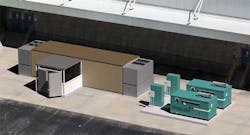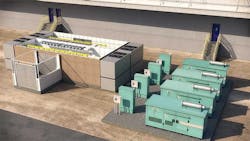The data center network of the future will extend from the edge to the cloud. Chris Crosby, the CEO of Compass Datacenters, wants to create a data center company that can deliver seamless infrastructure across that entire spectrum.
To support that vision, Compass has bought EdgePoint Systems and BitBox USA, two companies that specialize in distributed computing. The acquisitions will form the nucleus of Compass EdgePoint, an edge computing initiative that hopes to rapidly deploy small data centers on corporate premises and remote sites. Compass acquired both companies from a common owner, and financial terms of the acquisitions are not being released publicly.
Compass’ push into edge computing is part of an ambitious strategy to compete at all levels of the data center business. The company was founded to bring wholesale data centers to regional markets, and recently began targeting huge cloud computing companies with a large new data center campus in Virginia.
Crosby has had a front-row seat for the growth and industrialization of mission-critical infrastructure. He sees more change ahead, driven by the increased use of consumer mobile devices, video and the growth of sensor networks through the Internet of Things and autonomous cars. This will mean data centers in new places, and they won’t all look alike.
“This is an exciting time for the data center industry because the definition of a data center is changing so dramatically,” said Crosby. “Our acquisition of EdgePoint and BitBox put Compass at the forefront of where data centers are needed now.”
Talent From Google Fiber
EdgePoint Systems was founded by Sharif Fotouh, a key member of the Google Fiber infrastructure team, who will now lead the Compass EdgePoint initiative. EdgePoint creates small modular data centers that can be rapidly deployed, while BitBox USA creates a software suite that can manage networks of distributed facilities.
Compass will meld those capabilities with its lengthy expertise in real estate and data center construction. Compass was founded in 2012 by Crosby, a key player on the Digital Realty team that pioneered the wholesale data center, effectively creating a market for “plug and play” IT space as an alternative to on-premises IT facilities.[clickToTweet tweet=”Compass CEO Chris Crosby: This is an exciting time for the data center industry because the definition of a data center is changing so dramatically.” quote=”Compass CEO Chris Crosby: This is an exciting time for the data center industry because the definition of a data center is changing so dramatically.”]
“It wasn’t that long ago that the only model for a corporate data center was a monolithic, end-user-built structure that was inflexible, capital-intensive and inefficient in a hundred ways,” said Crosby. “Data centers have evolved significantly since then and need to be much closer to end users now.”
Compass EdgePoint is seeking to strike a tricky balance, creating an edge product that is standardized enough to be repeatable and affordable, while flexible enough to address a wide range of use cases.
Crosby said the addition of EdgePoint and BitBox “enable us to offer a broader range of mission critical solutions to customers to match their specific needs from the core of their IT infrastructure all the way out to the extreme edge, no matter how a customer defines the edge and where it resides.”
Expanding Compass’ Technology and Team
A key benefit of the acquisitions is the addition of Fotouh and Jon Trout, the founder of BitBox USA, who worked to help Google deploy its consumer fiber offering.
“Our solution is based on the experience Jon and I have gained from deploying hundreds of Google Fiber huts across the country,” said Fotouh. ““Compass has one of the most respected names in the industry, and we share a vision for how data center infrastructure needs to evolve to meet the technical and business requirements of tomorrow. We are the only provider who can offer customers dedicated data centers from the core to the edge.”[clickToTweet tweet=”Sharif Fotouh of Compass EdgePoint: We are the only provider who can offer customers dedicated data centers from the core to the edge.” quote=”Sharif Fotouh of Compass EdgePoint: We are the only provider who can offer customers dedicated data centers from the core to the edge.”]
“Compass has a holistic vision of IT infrastructure that views all data center assets as an integrated whole,” said Trout. “That is particularly important as data center infrastructure becomes more distributed in order to move computing power closer to end users. These are challenges I tackled while founding BitBox for some of the largest hyperscale and technology companies. I am really energized about continuing this work as part of the Compass family.”
“I couldn’t ask for two smarter, better people to be part of the team,” said Crosby.
Segmenting Into Tiers
Crosby has been vocal in his belief that the data center industry is segmenting into three tiers: huge core data centers, smaller facilities in second-tier markets, and micro-data centers at the edge – which could be a remote tower site or a space inside an office building.
Compass was founded to target the middle tier, looking beyond major tech hubs like Silicon Valley to bring quality data centers to secondary markets. Early Compass projects were built in Nashville, Minneapolis, Durham and Tulsa. Its approach features smaller data centers, offering up to 2.4 megawatts of IT capacity. Each building is dedicated to a single customer, but offers a menu of options to address different requirements. This allows Compass to standardize its design, using pre-fabricated components to control cost and speed to market, while acknowledging that no two customers are alike.
In 2015 the company updated its design to win cloud computing business, offering cloud builders an alternative path to constructing their own hyperscale cloud campuses. Compass recently won approval to build a 750,000 square foot data center campus in Northern Virginia, the largest market in the world for data centers and cloud computing.
The acquisitions and expansion are enabled by the support of its new ownership, which include private equity firm Redbird Capital and the Ontario Teachers Pension Fund, which bought a majority interest in the company in 2017. Crosby and the Compass management team retaining an equity stake and continuing to head the company’s operations.
In expanding its focus to the edge, Compass joins several data center companies targeting this opportunity, including Vapor IO, EdgeMicro and DartPoints. These companies plan to deploy micro modular data centers at the base of cell towers and other key points in the existing wireless network.
The Compass EdgePoint design can be deployed with additional power infrastructure to support higher redundancies and rack density. (Image: Compass Datacenters)
Mission Critical at the Edge
The Compass offering is distinct in that Crosby believes many customers will want the redundancy of a mission-critical data center, even when deploying distributed workloads in smaller facilities. That’s why Compass EdgePoint is designed for the most demanding IT environments, protecting multi-million-dollar investments in high-end gear that requires high density and redundancy, only in a smaller form factor.
The standard offering comes in 10 rack increments, each with a fully 2N electrical and mechanical infrastructure design and 80KVA of IT power. Each unit’s hardened shell can be expanded in size and delivered to any location, Compass says. An integrated vestibule and “mantrap” ensure all IT equipment is unaffected by internal temperature and humidity fluctuations as staff enter and leave.
Compass EdgePoint data centers can serve as regional hubs, or support smaller data center requirements at the network edge. Additional offerings are available in smaller rack increment sizes.
Compass believes it now has core competencies to deliver value throughout a project, from conception to maintenance. In the pre-installation phase, Compass Datacenters coordinates permitting and installation requirements while working with the customer to integrate and configure their IT equipment. Post-activation, BitBox personnel monitor and maintain each Compass EdgePoint unit with a white glove service.
“These are strategic investments for Compass that enable us to offer a broader range of mission critical solutions to customers to match their specific needs from the core of their IT infrastructure all the way out to the extreme edge, no matter how a customer defines the edge and where it resides,” said Crosby.
Explore the evolving world of edge computing further through Data Center Frontier’s special report series and ongoing coverage.
About the Author




